The benefits of dental veneers go beyond improving a tooth’s appearance. They present a comprehensive solution for dental patients seeking to enhance the aesthetics and functionality of their teeth. Dealing with discolouration, chips, or minor misalignments, veneers provide a transformative impact, creating a radiant and uniform smile. Veneers necessitate minimal tooth modification, unlike other dental techniques that demand extensive alterations to the tooth structure. The conservative approach preserves more of the natural tooth while achieving impressive cosmetic results.
Dental veneers are stain-resistant, which is a major benefit. Porcelen veneer teeth or composite resins resist coffee, tea, and tobacco stains. It preserves the veneers' brilliant, white appearance, adding to their longevity. Veneers last over a decade and require careful care, making them a cost-effective long-term dental treatment. One of the many substantial benefits of veneers is their ability to be customised. Veneers are meticulously designed to replicate the shape, size, and colour of the patient's natural teeth, guaranteeing a natural and seamless appearance. The degree of customisation enables a flawless fit, improving the veneers' aesthetic appearance, functionality, and comfort. Veneers are a versatile solution for numerous patients because they are customised to meet each patient's unique needs. The process allows them to resolve a broad spectrum of dental imperfections.
The 7 benefits of dental veneers are listed below.
- Dental Veneers help enhance the appearance of teeth: They replace discolouration, chipping, gaps, and misalignment to improve tooth appearance.
- Dental Veneers require minimal tooth alteration: A good fit and bond requires a tiny amount of enamel removal from the tooth.
- Dental Veneers are stain-resistance: Dental veneers, especially porcelain ones, resist stains. Non-porous porcelain resists food, drink, and smoke stains. Veneers stay longer and look brighter due to their quality.
- Dental Veneers are durable and can last for many years: Dental veneers are long-lasting with proper care. Veneers, made of porcelain or composite resin, sustain regular use, such as eating and speaking. Porcelain veneers are strong and stain- and chip-resistant. Veneers last 10–15 years or longer with good oral hygiene and regular dental checkups. The dentist's ability and the patient's dental habits affect the veneers’ longevity.
- Dental Veneers can be customised based on your teeth shape, etc.: The natural teeth's shape, size, and colour match dental veneers. The veneers merge effortlessly with the wearer’s smile due to personalisation, making them look natural and attractive.
- Dental Veneers can help you improve self-confidence. Dental veneers boost self-confidence by improving tooth appearance. It covers discolouration, chips, gaps, and misalignments, creating a more consistent and attractive grin. People feel more confident in social and professional situations with a better grin, improving their self-esteem and quality of life. The confidence boost improves mental health, personal opportunities, and career prospects.
- Dental Veneers can be your conservative approach in enhancing your teeth appearance: Veneers are to enhance the teeth’s appearance. It improves appearance with minimum dental structure change. Veneers hide discolouration, chipping, and minor misalignments for a more uniform smile.
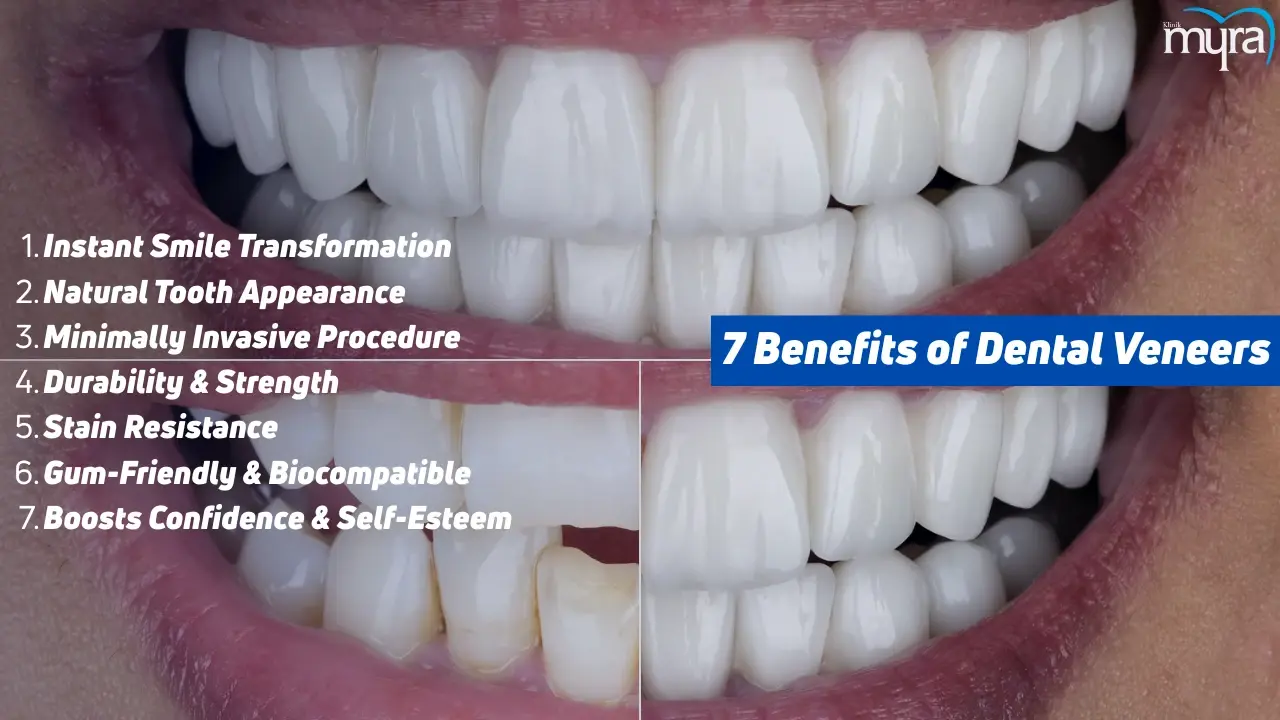
1. Dental Veneers help enhance the appearance of teeth.
Dental veneers help enhance the appearance of teeth without the need for surgery. Veneers have the potential to improve the appearance of a smile. The results are realistic, as veneers are designed to merge with natural teeth. Veneers are more effective at resisting staining than the tooth’s natural enamel. Dental veneers require no additional maintenance.
Minor flaws in teeth's appearance, whether noticeable by others or seen through pictures, affect self-esteem. Awareness of the flaws results in self-consciousness. A boost in confidence follows after a veneer is designed and fitted when posing for photos, meeting an employer, going on a date, or simply looking in the mirror.
2. Dental Veneers require minimal tooth alteration.
Dental veneers require minimal tooth alteration compared to other dental procedures. Dental veneers are custom-made wafers of dental porcelain bonded to the front of teeth to mask chips, heavy staining, or gaps, revitalising the smile with a minimal touch. Traditional veneers are thin, a millimetre or less, yet appear bulky when bonded to unprepared teeth. It requires the removal of a tiny piece of surface enamel to provide a natural appearance. The alteration is painless and minimal but permanent, requiring the tooth to have a veneer or another form of restoration.
A newer type of veneer, no-prep or minimal-prep veneers, is thinner, measuring 0.3 to 0.5 millimetres to avoid or reduce enamel removal. Ultra-thin veneers are bonded without fitting under the gum line and are ideal for smaller-than-normal teeth, worn-down teeth, misshapen teeth, or a narrow smile. Ultra-thin veneers are available for oversized or prominent teeth, yet some enamel removal is necessary. The enamel's condition has to be decent to be eligible for ultrathin veneers.
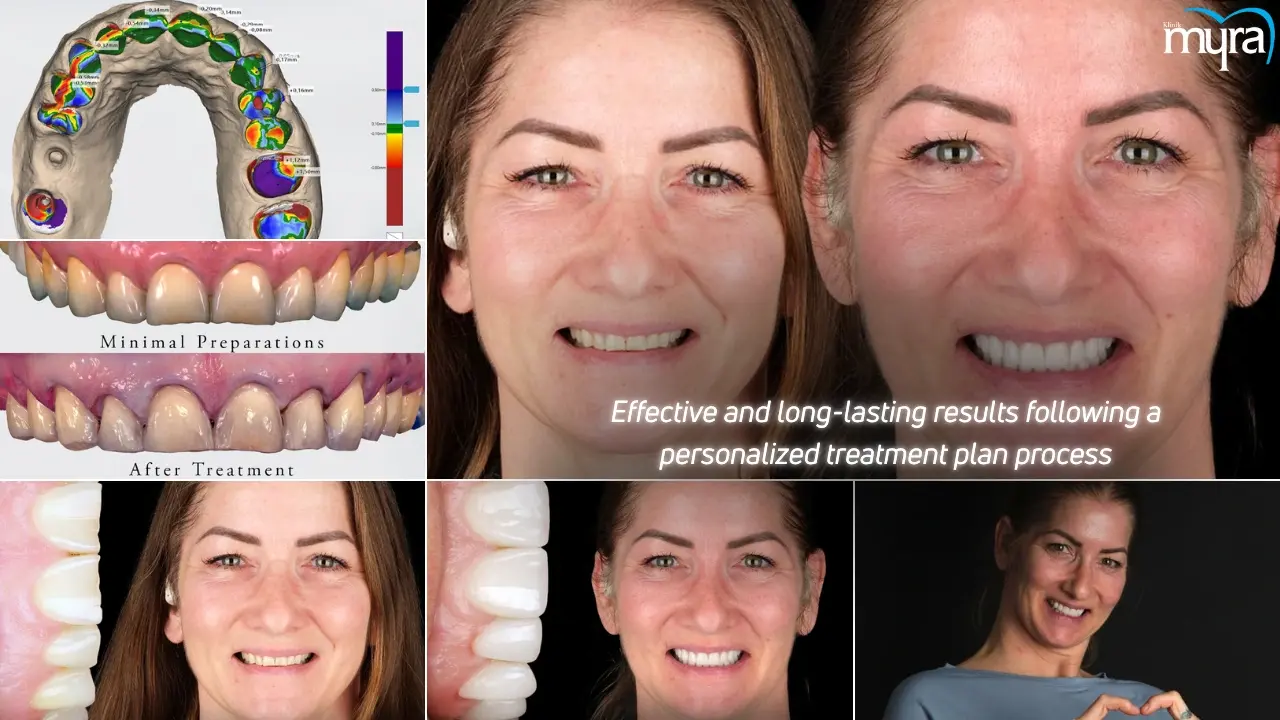
3. Dental Veneers are stain resistant.
Dental veneers are stain-resistant, especially the veneers constructed of porcelain. The danger of discolouration differs between porcelain veneers and genuine teeth. The reason behind this is that porcelain is not porous, resembling the enamel that constructs up natural teeth. Porcelain, a glass-ceramic material, does not absorb pigments from food and drinks like natural teeth, making it resistant to stains, including coffee, tea, and red wine.
Veneers are coated with a stain-resistant resin for extra protection, attracting patients seeking a long-lasting solution to discoloured teeth. Composite veneers are susceptible to discolouration over time and must be replaced after five to seven years of use.
4. Dental Veneers is durable and can last for many years.
Dental veneers are durable and can last for many years. Porcelain-made dental veneers are recognised for their strength and lifespan due to the accuracy with which veneers are manufactured and positioned. Porcelain, a thin, translucent glass ceramic material, is resistant to wear and tear, making it an ideal choice for long-lasting solutions.
The American Dental Association estimates that veneers have a lifespan of approximately ten years and, with proper care, withstand daily forces such as biting and chewing without causing damage. The veneer technique is irreversible, and regular dentist visits help it last numerous years without discolouration or breakage. A small amount of enamel must be removed from the tooth to accommodate the veneer, typically a millimetre in size. Removing a veneer requires replacing it with a new one. Durability offers a long-term investment in dental health and improves the smile's cosmetic appeal.
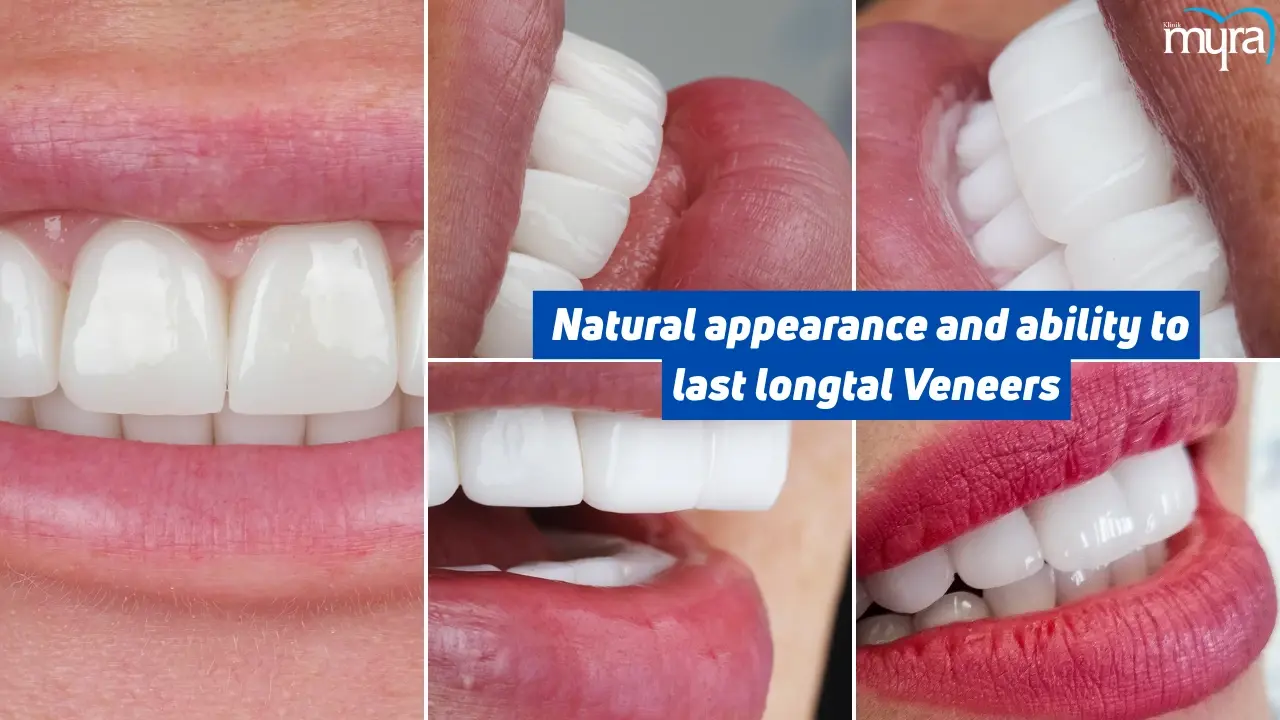
5. Dental Veneers can be customized based on your teeth shape etc.
Dental veneers can be customised based on your teeth's shape. The dentist reshapes the tooth surface by removing an amount of enamel roughly equal to the veneer’s thickness to prepare a tooth for a veneer. Anaesthesia is used depending on the patient’s preference. A model or impression of the tooth is made and sent to a dental laboratory to create the veneer, which takes 2-4 weeks. Temporary veneers are used during the waiting period.
The dentist inspects the veneer for fit and pigment upon completion, and any necessary adjustments are made to ensure a proper fit. The next step is polishing, cleaning, and etching the tooth to promote a solid connection. The veneer is coated with a unique cement before being affixed to the tooth. The cement's shade is used to change the veneer's colour. The cement hardens rapidly when compounds are activated by a laser beam positioned correctly. A follow-up appointment is scheduled to ensure the veneer placement and gums are satisfactory.
6. Dental Veneers can help you improve self-confidence.
Dental veneers can help you improve self-confidence and enhance the appearance of teeth.
Getting dental veneers involves diagnosis, treatment planning, preparation, and bonding. It suits people with discoloured, worn-down, chipped, broken, misaligned, uneven, irregularly shaped, or gapped teeth.
Exploring the deep connection between dental veneers and self-confidence reveals how cosmetic enhancements improve mental well-being. The emotional impact of dental veneers extends beyond aesthetics, contributing to self-esteem and psychological health. Dental veneers increase confidence levels by allowing a person to smile freely without the fear of exposing dental imperfections. The newfound confidence positively influences social interactions and professional engagements.
Veneers improve appearance by addressing issues that lead to an immediate enhancement in self-perception. Feeling attractive and content elevates self-esteem, making the wearer feel capable and assertive in various aspects of life. Alleviating insecurities related to dental appearance, veneers help reduce feelings of self-consciousness and social anxiety, fostering a positive and engaging demeanour.
The benefits of dental veneers extend to mental health. It helps people feel better mentally and less stressed and anxious when they are happy with the way they smile. Improving self-perception and emotional well-being demonstrates that dental veneers are more than a cosmetic operation. It represents an investment in the psychological health and quality of life. Dental veneers improve emotional and mental wellness in addition to cosmetic benefits.
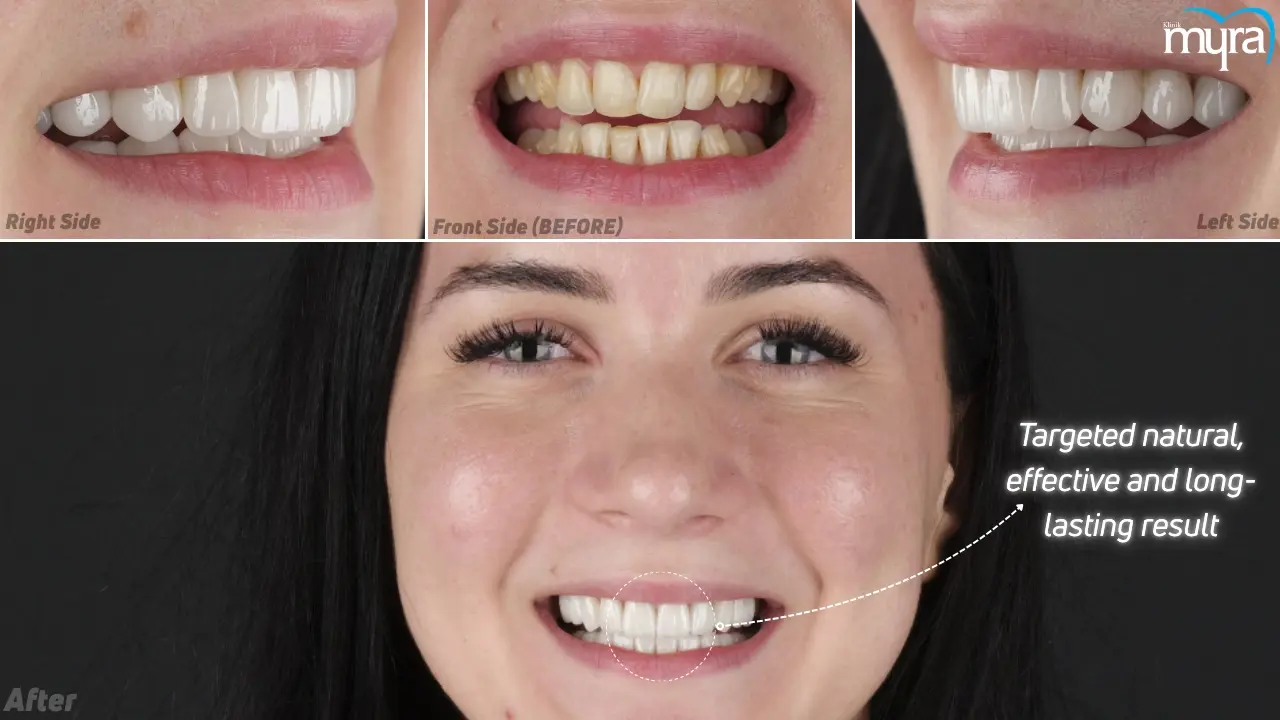
7. Dental Veneers can be your conservative approach in enhancing your teeth appearance.
Dental veneers are a conservative solution for altering a tooth's colour and shape, requiring less extensive shaping than crowns. It provides a stronger and more aesthetically attractive alternative. Dental veneers offer numerous benefits that enhance aesthetic appeal and dental health. It is ideal for closing large spaces and gaps between teeth and whitening severely stained or discoloured teeth. Dental veneers improve the appearance of irregularly shaped teeth, correcting slightly crooked teeth and restoring broken, chipped, worn, or fractured teeth.
Veneers provide an instant smile makeover with customisation to match natural teeth, ensuring a seamless look. It improves dental health by providing a protective layer that reduces the risk of chips and cracks, which are well-tolerated by gum tissue. Enhancing self-confidence with a beautiful smile positively impacts social and professional interactions. Veneers are versatile, addressing colour correction and customising the shape and size of teeth, making them suitable for various aesthetic concerns. Dental veneers are a durable, long-term solution that is highly resistant to wear and maintains its appearance over time.
What is Dental Veneers?
Dental veneers are thin, custom-made shells designed to improve the appearance of teeth by covering the front surface. It fixes cosmetic problems such as chipped, broken, discoloured, or small teeth. Veneers are made from porcelain or resin composite materials and are permanently attached to the teeth. There are dental patients who choose to receive a single veneer for broken teeth, yet most dental patients decide to get six to eight veneers to achieve a balanced and even smile. Veneers are placed on the upper front eight teeth, the most standard site.
The primary benefit of dental veneers is to improve the overall appearance of the teeth, resulting in a more uniform and illuminated smile. Veneers address various cosmetic difficulties, including fractured or chipped teeth and severe discolouration. Veneers are used for situations that bleaching cannot remedy, such as gaps between teeth or teeth that are smaller than average, pointed, or odd.
Dental veneers are made from porcelain or composite resin and require careful preparation. Traditional veneers involve grinding the tooth structure beyond the enamel to ensure proper placement. The process is irreversible, painful, and requires local anaesthesia. The amount of tooth reduction needed depends on the dental concerns and the number of teeth being treated. A dentist creates a wax model to demonstrate how the veneers are going to look in some cases. No-prep veneers, such as Lumineers and Vivaneers, require minimal tooth alteration, affecting the enamel. These types of veneers do not need local anaesthesia or temporary veneers.
Porcelain and composite resin are the two most common materials used for dental veneers, which are two materials used for improving smiles. Porcelain veneers are thin, custom-made shells permanently attached to natural teeth, known for durability and attractive appearance. It requires a more complex procedure involving dental impressions and off-site laboratory work. Composite resin veneers, constructed from tooth-coloured resin, are thin shells directly applied and sculpted onto teeth, making the approach faster and less invasive. The choice between porcelain and composite resin veneers depends on budget, the extent of enamel damage, and personal discretion.
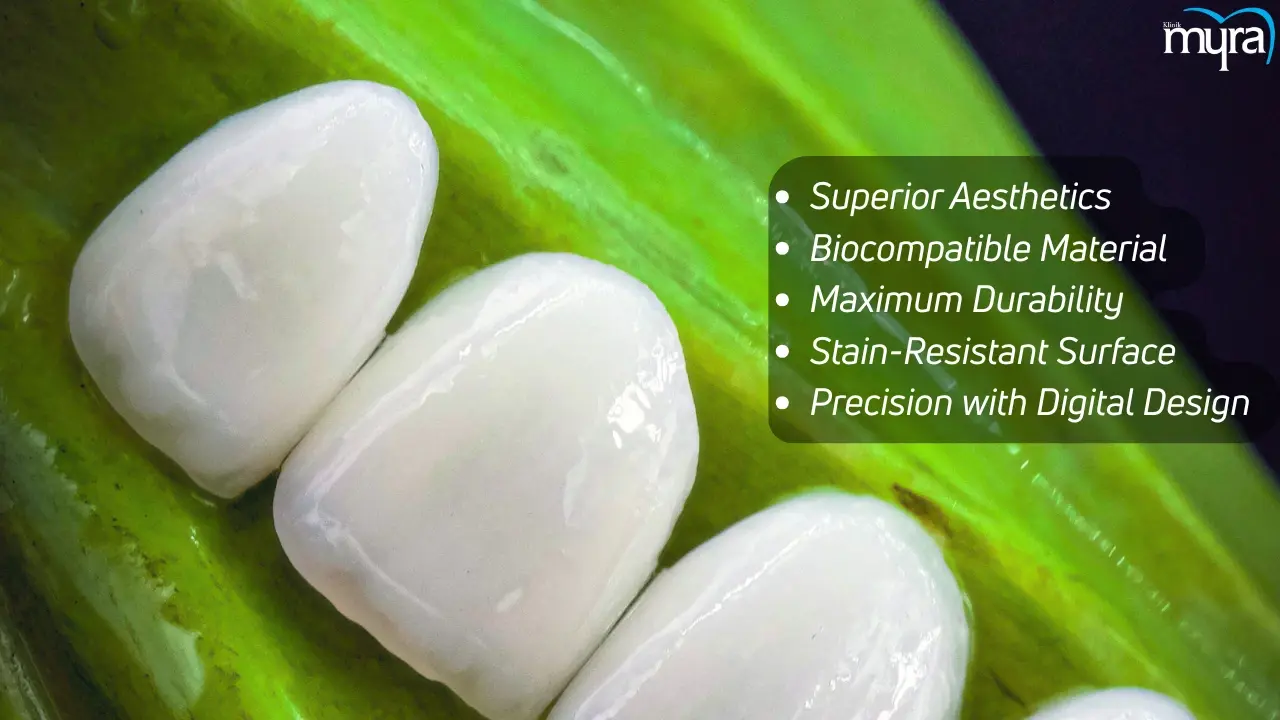
What to know more about Dental Veneers?
Dental veneers are thin, custom-made shells designed to shield the front exterior of teeth to enhance their appearance by altering colour, shape, size, or length. Dental technicians use suitable dentistry materials such as tooth-coloured composite or porcelain. Dental veneers are utilised for looks, covering up many flaws in the appearance, such as chips, cracks, gaps, and discoloured teeth.
Veneers work by shielding the front surfaces of teeth to enhance the appearance of a smile, effectively concealing cosmetic flaws. Veneers are designed to mask stubborn stains that do not respond to teeth whitening and small or misshapen teeth. Veneers are suitable for any person looking to improve their smile's aesthetics. The dental restorations solve various imperfections, creating a more uniform and attractive appearance for the teeth. There are several varieties of veneers, such as porcelain veneers, composite veneers, no-prep veneers, and removable veneers.
The dental veneer procedure involves several key steps. A consultation and examination are conducted, during which the dentist evaluates the suitability of veneers for the patient using X-rays and tooth impressions. Half a millimetre of enamel is removed from the tooth surface to match the thickness of the veneer during the preparation phase. An impression of the teeth is then taken and sent to a dental laboratory to create custom veneers.
The dentist first checks the fit and colour of the veneers in the bonding stage, making any necessary adjustments. The teeth are cleaned, polished, and etched for a strong bond. Special cement is applied to the veneers and then placed on the teeth. Excess cement is removed once correctly positioned, and a special light is used to activate the chemicals in the cement, causing it to harden quickly and securely bond the veneers to the teeth.
Long-term care for dental veneers involves several important practices to maintain their appearance and durability. First, maintain good oral hygiene by brushing and flossing daily with a soft-bristled toothbrush and non-abrasive fluoride toothpaste. Consider using interdental brushes or a water flosser for effective cleaning. Avoid stain-causing foods and drinks, such as coffee, tea, and red wine, to keep a consistent colour between veneers and natural teeth. Refrain from using teeth as tools to open bottles or bite complex objects to prevent damage.
Wearing a mouth guard during contact sports or grinding teeth at night protects veneers from damage. Regular dental check-ups are essential to spot potential issues early and provide appropriate treatment. Avoid crunchy and sticky foods that stress dental veneers and cause detachment. Lastly, quit smoking, as tobacco products discolour natural teeth and compromise overall oral health.
How to take care of dental veneer?
To take care of dental veneers, follow the steps listed below.
- Brush teeth twice a day. Brush teeth twice daily using fluoride toothpaste, paying attention to the gum line, hard-to-reach back teeth, and areas around fillings, crowns, or veneers. Brush for about two minutes each time, especially in the morning after breakfast and at night before bed. Regular flossing and dental check-ups are needed for maintaining oral health and preventing cavities. The use of fluoride toothpaste helps remove plaque effectively and prevents cavities.
- Floss once daily. Flossing helps maintain dental veneers and teeth. Break off 18 inches of dental floss, wind it around each middle finger, and gently slide it between teeth. Avoid snapping or forcing the floss, and use clean sections. Floss once daily to remove plaque and food particles between teeth and gum line. Floss before bedtime to prevent overnight damage. Flossing in conjunction with brushing is advised for maintaining teeth and veneer health, as well as regular check-ups and professional cleanings.
- Use a fluoride mouth rinse daily. Using a fluoride mouth rinse daily helps maintain dental veneers and natural teeth. Choose a fluoride mouth rinse, swish it for one minute, and do not swallow. Use the mouth rinse daily, especially at night, after brushing and flossing to protect veneers and natural teeth from decay. Maintain regular check-ups with the dentist to ensure overall oral health. A fluoride mouth rinse strengthens tooth enamel, wipes away plaque, and helps prevent cavities.
- Limit sweets consumption. Limiting sweets consumption starts by being mindful of diet and replacing sugary snacks with healthier options. Read food labels for hidden sugars and opt for natural or sugar-free sweeteners. Consistently limiting sweets reduces tooth decay and extends veneers' lifespan. Consume sweets after meals to minimise sugar's harmful effects on teeth. A balanced diet and good oral hygiene help maintain veneers and natural teeth.
- Avoid chewing ice and using teeth as tools. Maintaining dental veneers requires conscious actions and consistent use of appropriate tools. Avoid chewing ice or using teeth as tools, as doing so causes damage. Regularly avoiding these habits prevents veneer wear, tear, or even breakage. Treating veneers with care and understanding how to care for veneers helps with longevity. Porcelain veneers are durable but get damaged by chewing hard substances.
- Regular dental check-ups. Regular dental check-ups are needed to maintain dental veneers. Schedule an appointment with a dentist to examine veneers for signs of damage and assess overall oral health. The includes cleaning, X-rays, and preventive treatments. Visit every six months, with frequency varying based on personal needs. Schedules are flexible, with morning appointments preferred. Regular check-ups remove plaque and tartar buildup, monitor veneer condition, and maintain oral health. Learning how to take care of veneers helps maintain veneer appearance and longevity.
- Maintain good overall oral hygiene. Maintaining good oral hygiene is needed for dental veneers, including brushing and flossing twice a day, using non-abrasive toothpaste, and using mouthwash. Regular dental check-ups to monitor veneer condition and overall oral health. Consistency in oral hygiene routines, including brushing, flossing, and mouthwash, contributes to the longevity of porcelain veneers and a gorgeous smile.
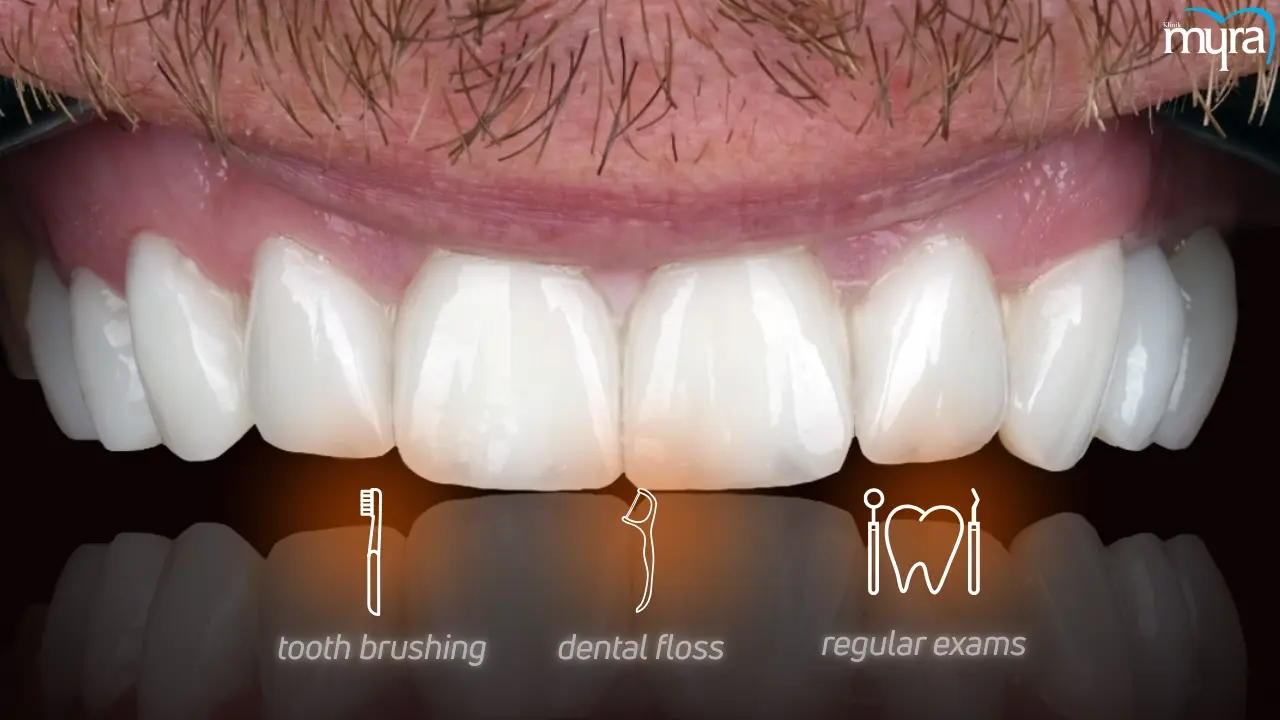
How long do teeth with veneers last?
Teeth with veneers last approximately 10 years and more. The expected lifespan of a veneer is ten years or more, provided that it is well-maintained. The veneer lifespan goes lower depending on the material used to make the veneers. Veneers become stained or cracked over time, similar to natural teeth. Dental veneers are a permanent treatment. Holding the veneers requires the tooth underneath to get damaged. Replace the veneer if it is broken or damaged in any way. Veneers are less invasive than composite bonding and require less maintenance. Veneers have a longer lifespan.
There are two primary types of dental veneers which are composite resin and porcelain, each with distinct characteristics. Composite resin veneers are preferred for cost-effectiveness, ranging from £195 ($250) to £1164 ($1,500) per tooth. The veneers are made from the same material used in tooth-coloured dental fillings and last for 5 to 7 years, extending up to 10 years with proper care. Patients have the option to opt for direct composite veneers, which involve applying the composite material directly onto the teeth, or indirect composite veneers, fabricated outside the mouth before being fitted.
Notable characteristics of porcelain veneers include their natural appearance and ability to last long. Dental veneers last as long as twenty years if properly cared for and maintained. Veneers have ten to fifteen years of lifespan with adequate care and maintenance. Porcelain veneers are more expensive than other veneers, running anywhere from £718 ($925) to £1940 ($2,500) per tooth, and must be fabricated in a dental laboratory. Porcelain veneers are preferred by patients looking for a long-term solution because of their excellent cosmetic qualities and durability.
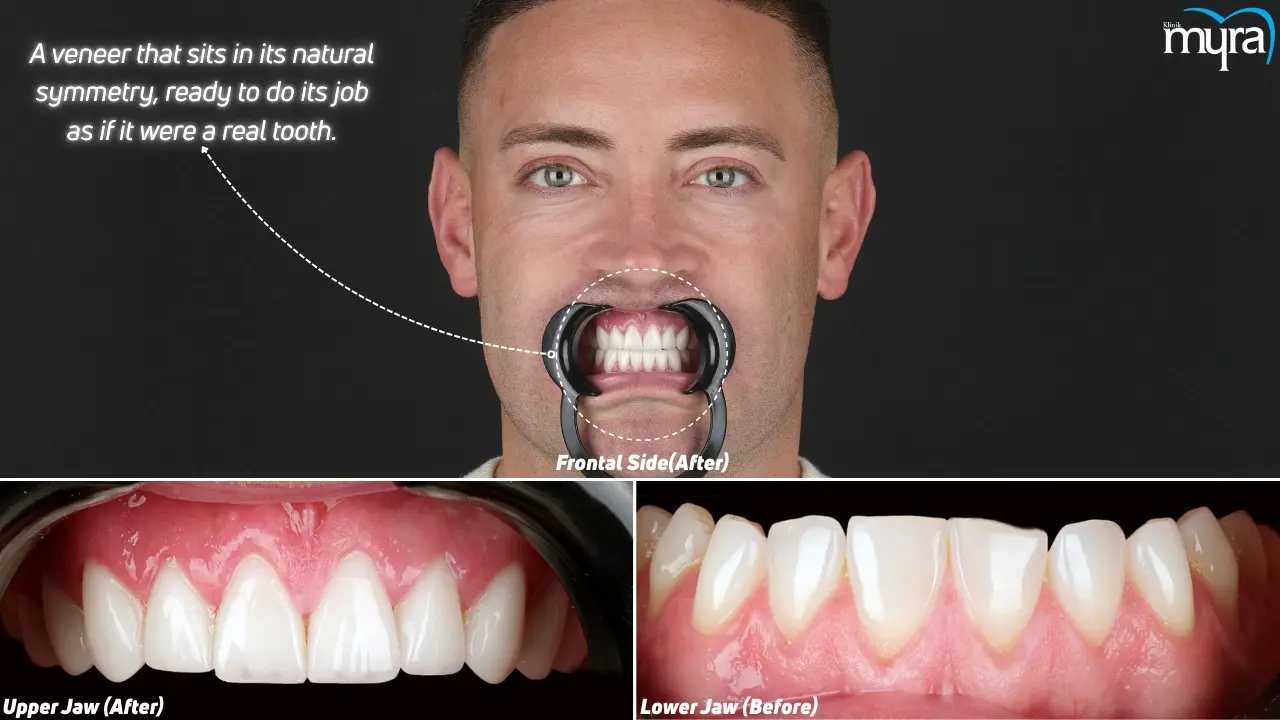
Who is a suitable candidate for veneers?
A suitable candidate for veneers is people with stained, misaligned, and mall imperfections on the tooth. The candidate must have good baseline oral health. Veneers cannot be placed on teeth severely decayed or affected by gum disease, and any existing oral health issues must be addressed and treated before considering veneers. Veneers are used to cover up gaps between teeth and protect teeth with worn-down enamel.
Regular oral hygiene includes routine dental cleanings and consistent brushing and flossing habits. Good oral hygiene helps preserve the integrity of the veneer and prolong the lifespan. Candidates must have moderately straight teeth. Veneers improve the appearance of mildly crooked teeth, but severely misaligned teeth require orthodontic therapy before being considered for veneers. A small amount of enamel must be removed to fit the veneers securely and ensure looking natural. Enough enamel must remain after preparation to support the veneer effectively.
Bruxism has a higher failure rate of veneers and patients with a history of grinding need to restore teeth before getting veneers. Maintaining proper dental hygiene is crucial. Habits, including grinding teeth, chewing fingernails, and biting pens, harm veneers. A person who maintains good oral hygiene and has a few straight teeth, enough enamel, and decent oral habits is a good candidate for veneers.
What age is ideal for veneer placement?
The ideal age for veneer replacement is 18. Dentists suggest delaying veneer consideration until at least 18 years old. Teeth and gums have normally completed their growth by this age, and people are old enough to appreciate the time and effort required for veneers.
The best age for veneers depends on dental and oral health, lifestyle, personal goals, and financial considerations. Dental and oral health, including teeth development and underlying issues such as decay or gum disease, impact the success of veneer treatment. Lifestyle, including diet, oral hygiene, and teeth grinding or clenching habits, affect veneer longevity. Personal goals and expectations, such as long-term or temporary solutions, must be considered.
Veneers are considered for younger people in certain situations, particularly when the tooth has cosmetic severe dental problems. Veneers are beneficial, for example, for an adolescent who has severe discolouration or staining and is not responding to teeth-whitening procedures. Case-by-case judgements, including involvement from the patient's parents or guardians, must be taken. The patient's overall well-being is another important consideration before obtaining a veneer. Veneers require healthy teeth and gums to function correctly. Untreated cavities, gum disease, or other oral health concerns must be addressed before veneer placement.
What is the procedure for dental veneers?
The procedure for dental veneers involves removing a thin layer of enamel from the teeth, taking impressions, creating custom veneers in a lab, and bonding to the teeth. It involves several steps and may require multiple visits to the dentist.
The first step is a consultation, during which the dentist discusses dental concerns and selects the preferred tooth colour and shape. The consultation includes a thorough dental examination and X-ray imaging. The second visit includes the dentist checking the veneers' shape, colour, and fit before the permanent bonding. The dentist reshapes the tooth to accommodate the veneer and makes an impression for a dental laboratory to make the veneer. The process involves grinding down the tooth structure and removing some teeth past the enamel. It is an irreversible procedure that is painful and requires a local anaesthetic.
The dentist places the veneers on the prepared tooth and cements it in place once ready. Temporary veneers are used until the permanent veneers come back from the lab. There is no downtime following the dentures procedure, and everyday activities, including eating and drinking, are resumed immediately after the anaesthesia wears off. There are "no prep" veneers, which affect the enamel and don't require local anaesthetics or temporary veneers. The type of veneer chosen depends on cost, installation time, and specific dental concerns.
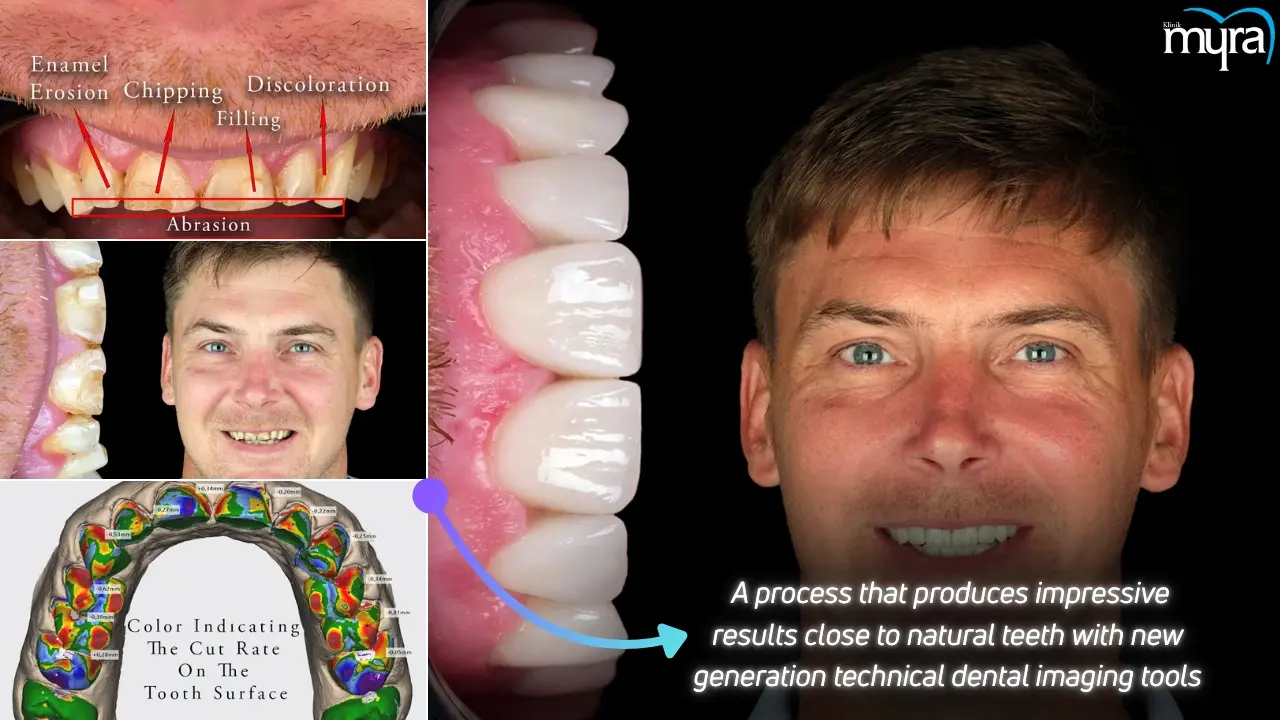
Is getting veneers painful?
No, getting veneers is not painful. The veneer procedure is painless, as patients are administered local anaesthesia. It is expected to anticipate a minor sensitivity following the final fitting. This is not cause for concern, as it subsides over a few days as the patient recovers. It is most encountered in complex cases where multiple remedies are administered concurrently. A specialist dentist is going to discuss any treatment outcomes with the patient at the examination appointment.
Patients with eight or more veneers experience mild soreness in the gums and jaw, typically alleviated with over-the-counter medications. Use non-abrasive toothpaste and floss repeatedly, rinse frequently, and consider using mouth guards to protect against wear to maintain and care for new veneers.
Do veneers require surgery?
No, veneers do not require surgery. Veneers are a permanent solution that does not require surgery. Dental veneers are a cosmetic procedure that involves a multi-step process that does not involve surgery but requires tooth preparation. The process starts with a consultation to discuss desired outcomes and design a personalised smile using advanced software. The most invasive step involves preparing natural teeth by removing some enamel to create space for the veneers, making the treatment permanent as enamel does not regenerate. Impressions are then taken to shape custom veneers produced in a lab. Temporary veneers are worn to protect the teeth in the interim. A return visit is needed to bond the veneers permanently once the porcelain veneers are ready, resulting in a flawless new smile.
Veneers are favoured by numerous individuals due to the absence of surgical intervention. The procedure is non-invasive and necessitates minimal preparation compared to other dental procedures. The dentist removes a thin layer of enamel from the teeth to create space for the veneers, guaranteeing a natural appearance and a proper fit. Impressions are obtained and transmitted to a laboratory to develop personalised veneers. The veneers are affixed to the teeth using dental cement hardened with a specialised light once prepared. The simple procedure is benign, necessitates local anaesthesia, and offers important cosmetic enhancements without surgical intervention.
How much is a Dental Veneer in Turkey?
A dental veneer in Turkey costs £101 ($130) to £1553 ($2000). The cost varies depending on the clinic and the material used. Dental veneers in Turkey are more affordable compared to the US, with prices ranging from £101 ($130) to £256 ($330) per tooth, depending on the material used. Porcelain veneers in Turkey cost around £202 ($260), while zirconium veneers are priced at approximately £171 ($220).
The cost of dental veneers in the US reaches up to (£1553) $2,000 per tooth, allowing for savings of up to 80% when opting for treatment in Turkey. An example is that composite resin veneers are priced at £101 ($130) in Turkey compared to £621 ($800) in the US, and E-max veneers are priced at £256 ($330) in Turkey and £1010 ($1,300) in the US.
Porcelain veneers are priced in Turkey at £202 ($260) compared to £1165 ($1,500) in the US. Zirconium veneers are priced at £171 ($220) in Turkey and £1553 ($2,000) in the US, demonstrating cost benefits for international patients seeking dental care in Turkey.
Cosmetic dentistry in Turkey, particularly veneers, has surged in popularity over the past decade, driven by social media trends and celebrity influence. Celebrities showcasing their natural-looking veneers on platforms such as Instagram have sparked a demand for the "Hollywood Smile" achieved through dental veneers. The rise in popularity is due to dental veneers in Turkey offering a quick and effective solution for dental issues such as discolourations, misalignments, chips, or gaps. Veneers provide a radiant, picture-perfect smile that boosts self-confidence, with each veneer custom-made to fit perfectly into the tooth structure.
Dental veneers are more affordable in Turkey due to several factors, including the lower cost of living compared to the US and UK, which reduces labour costs for dental treatments and staff. Turkey's competitive dental tourism industry offers cost-effective treatments and all-inclusive packages to attract international patients. The favourable exchange rate of the Turkish Lira against major currencies such as the British Pound, US Dollar, and Euro makes dental treatments budget-friendly for foreign visitors. Affordable international flight options and efficient public transport further minimise travel expenses. Clinics in Turkey provide complimentary services such as pick-up and drop-off facilities and initial consultations, enhancing the overall affordability of dental veneers in the country.
Is veneers part of the Turkey Teeth Procedure?
Yes, veneers are part of dental procedures in Turkey, but it is essential to choose a reputable clinic for safe and high-quality treatment. Turkey has become a leading destination for dental care, attracting international patients with its advanced technology, experienced dentists, and cost-effective solutions.
Many accredited dental clinics in Turkey adhere to strict hygiene and safety standards, using high-quality materials that meet international dental regulations. Reputable clinics employ highly skilled dentists who are members of globally recognized dental organizations, ensuring safe and effective treatments.
While some unregulated clinics may offer low-cost treatments, leading to potential risks, patients can avoid complications by selecting a well-established clinic with a proven track record. Certified clinics in Turkey provide comprehensive pre- and post-treatment care, ensuring long-term success and patient satisfaction.
Turkey’s dental tourism industry is built on quality, affordability, and trust. With proper research and choosing a licensed clinic, patients can confidently undergo procedures like veneers, implants, and smile makeovers in a safe and professional environment.
What is the best clinic to have dental veneers?
The best clinics to have dental veneers include Tower Dental Clinic, Myra Dental Centre, West Dental Clinic Turkey, and Bayindir Healthcare Group.
Tower Dental Clinic in Istanbul, Turkey, offers world-class dental services with top-notch facilities. The clinic has state-of-the-art technology and modern equipment to provide the best treatment. The staff is known for being friendly and attentive, ensuring a comfortable experience during each visit. Tower Dental Clinic in Istanbul, Turkey, offers a wide range of dental services, including crowns, bridges, Emax veneers, and dental implants. The price ranges from £148 ($190) to £4505 ($5800). It has a 4.5-star rating, and the clinic is known for its professional and dedicated dental team that ensures integral medical attention for every patient. Dentists discuss treatment possibilities and processes, allowing patients to choose the most appropriate option during a dentist consultation.
Myra Dental Centre is another top-tier dental clinic in Turkey. Myra Dental Centre Turkey specialises in state-of-the-art dental implants, providing high-quality and effective solutions for patients' oral health. The clinic takes pride in its comprehensive portfolio, featuring testimonials and before-and-after photos showcasing the treatments' transformative impact. Understanding the value of a beautiful smile, Myra Dental Centre is dedicated to being integral to each patient's journey towards achieving an ideal smile. The clinic utilises cutting-edge technology to ensure optimal dental outcomes, employing soft tissue lasers, advanced smile design software, and in-clinic CAD/CAM milling machines. The commitment to excellence is reflected in the clinic’s team of highly trained, English-speaking dentists and surgeons, all esteemed members of the Turkish Dental Association. The centre prides itself on delivering high-quality care and transformative dental experiences. It has an average Trustpilot rating of 4.7 stars out of 5.

West Dental Clinic Turkey in Izmir is a premier facility offering a wide range of dental treatments to international patients at affordable prices. The clinic is equipped with modern technologies, operates daily until 23:00 and is managed by a professional team. It is one of the best clinics for veneers in Turkey with services, including dental implants, all-on-four implants, surgical treatments, gum surgeries, whitening, smile design, laminate porcelain, orthodontics, paediatric dental care, and dental aesthetics. The clinic's goal is to ensure proper treatment and patient satisfaction. West Dental Clinic receives an average rating of 4.5 stars out of 5.
Bayindir Healthcare Group, based in Ankara, Turkey, is a leading healthcare provider known for its network of three esteemed hospital branches. The group is distinguished by its dedication to high-quality medical services, offering comprehensive healthcare solutions and advanced medical treatments across various locations. Emphasising patient-centred care and leveraging cutting-edge technology, each Bayindir Healthcare Group branch contributes to the health and well-being of the communities it serves. Bayindir Healthcare Group provides cutting-edge bone marrow transplantation, cochlear implants, cardiology, dental treatment, oncologic surgery, and interventional radiology services. Experienced medical specialists staff in each area, offering state-of-the-art care and treatments utilising state-of-the-art technology.





